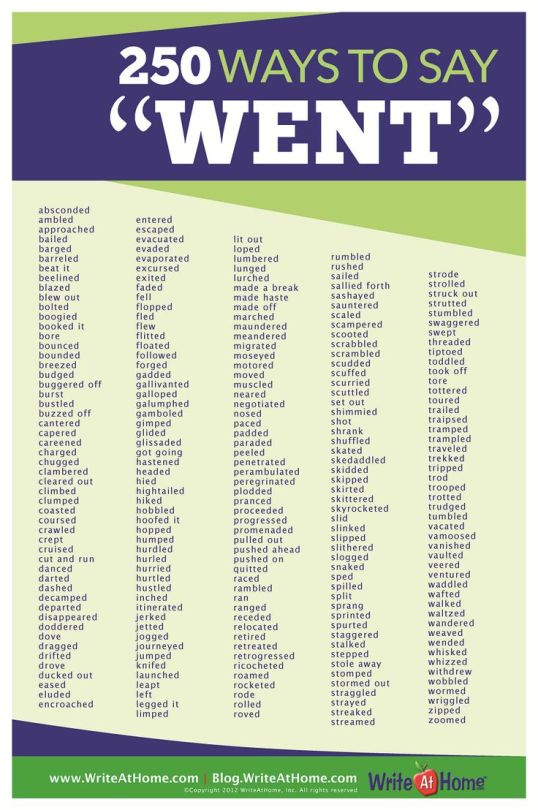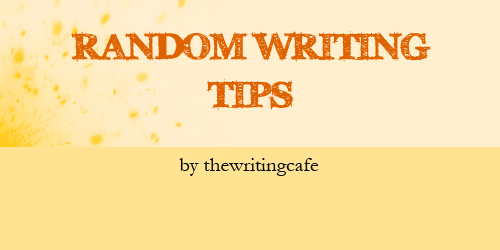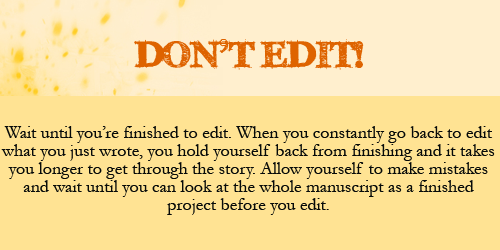1461 posts
250 Ways To Say Went

250 ways to say ‘went’
Buy the Poster: WriteAtHome
-
 sleepydreameroncloud9 reblogged this · 1 month ago
sleepydreameroncloud9 reblogged this · 1 month ago -
 littlesuekzn liked this · 2 months ago
littlesuekzn liked this · 2 months ago -
 arriejohnson liked this · 5 months ago
arriejohnson liked this · 5 months ago -
 mitsuko-saito liked this · 5 months ago
mitsuko-saito liked this · 5 months ago -
 myblogformyideas reblogged this · 6 months ago
myblogformyideas reblogged this · 6 months ago -
 circles19 reblogged this · 6 months ago
circles19 reblogged this · 6 months ago -
 circles19 liked this · 6 months ago
circles19 liked this · 6 months ago -
 increasinglygeeky reblogged this · 6 months ago
increasinglygeeky reblogged this · 6 months ago -
 roselyn-writing reblogged this · 6 months ago
roselyn-writing reblogged this · 6 months ago -
 roselyn-writing liked this · 6 months ago
roselyn-writing liked this · 6 months ago -
 mortemain liked this · 10 months ago
mortemain liked this · 10 months ago -
 stephendorff reblogged this · 10 months ago
stephendorff reblogged this · 10 months ago -
 derkiel liked this · 10 months ago
derkiel liked this · 10 months ago -
 millennial-teenybopper liked this · 1 year ago
millennial-teenybopper liked this · 1 year ago -
 illuminated-fox liked this · 1 year ago
illuminated-fox liked this · 1 year ago -
 fluffyneon reblogged this · 1 year ago
fluffyneon reblogged this · 1 year ago -
 fluffyneon liked this · 1 year ago
fluffyneon liked this · 1 year ago -
 frshadow reblogged this · 1 year ago
frshadow reblogged this · 1 year ago -
 zeroducks-2 liked this · 1 year ago
zeroducks-2 liked this · 1 year ago -
 hopetimistic reblogged this · 1 year ago
hopetimistic reblogged this · 1 year ago -
 enervatedquiddity reblogged this · 1 year ago
enervatedquiddity reblogged this · 1 year ago -
 bomberstillplaysvideogames liked this · 1 year ago
bomberstillplaysvideogames liked this · 1 year ago -
 eclairs-of-emptiness reblogged this · 1 year ago
eclairs-of-emptiness reblogged this · 1 year ago -
 heismymirror reblogged this · 1 year ago
heismymirror reblogged this · 1 year ago -
 lalalano liked this · 1 year ago
lalalano liked this · 1 year ago -
 sehunpilled liked this · 2 years ago
sehunpilled liked this · 2 years ago -
 thegraphitearchives reblogged this · 2 years ago
thegraphitearchives reblogged this · 2 years ago -
 againtodreaming reblogged this · 2 years ago
againtodreaming reblogged this · 2 years ago -
 againtodreaming liked this · 2 years ago
againtodreaming liked this · 2 years ago -
 eilieswilliams liked this · 2 years ago
eilieswilliams liked this · 2 years ago -
 reblogorelse reblogged this · 2 years ago
reblogorelse reblogged this · 2 years ago -
 wolfhead liked this · 2 years ago
wolfhead liked this · 2 years ago -
 ihavealotofstartrekfeels reblogged this · 2 years ago
ihavealotofstartrekfeels reblogged this · 2 years ago -
 write-through-the-gloom reblogged this · 2 years ago
write-through-the-gloom reblogged this · 2 years ago -
 csi-baker-street-babes liked this · 2 years ago
csi-baker-street-babes liked this · 2 years ago -
 shuffle-your-heart liked this · 2 years ago
shuffle-your-heart liked this · 2 years ago -
 lapis-lazuliie reblogged this · 2 years ago
lapis-lazuliie reblogged this · 2 years ago -
 selenecrown liked this · 2 years ago
selenecrown liked this · 2 years ago -
 maxellera reblogged this · 2 years ago
maxellera reblogged this · 2 years ago -
 maxellera liked this · 2 years ago
maxellera liked this · 2 years ago -
 solachii reblogged this · 2 years ago
solachii reblogged this · 2 years ago -
 solachii liked this · 2 years ago
solachii liked this · 2 years ago -
 lavander-aavaros liked this · 2 years ago
lavander-aavaros liked this · 2 years ago
More Posts from Getwrit








Word Tracking Spreadsheets - These sheets also have sections for character and plot information.

The Writers’ Retreat
For the July 20 NY Times Book Review. Thanks to AD Nicholas Blechman and editor Pamela Paul!
What should I know about creating the turning point for a character? Like when character a learns to be less selfish, and character b learns to be less judgemental.
A turning point is a moment of significant story change whereas characters changing don’t have to have large consequences.
The Turning Point is Major: This is a major part of the story that revolves around the main character. It causes a change in the main story.
Something Must Cause It: Something might be revealed, there might be an “Aha!” moment, or some event might significantly change your character quickly. No matter what it is, the cause of the turning point must be present and it must be strong. This doesn’t mean that it has to be some elaborate scene. The cause of the turning point can be as little as one word, but even just a single word has the power to create a change in your character.
Your Character Must Change: The turning point will change your character in some way. It might change their motive, their means of achieving their goal, their relationship with another major character, their moral alignment, their personality, etc.
It May Be the Black Moment: While there can be several small turning points throughout a story (conflicts cause a change of plans, characters come up with new ideas, stuff that isn’t major), the major one might coincide with the Black Moment. This is when all hope is lost for both the reader and the characters. It comes prior to the climax and appears as though your characters are going to lose. Sometimes this moment causes a significant change in character, relationships, pace, and direction of the story.
Show This Change: Show how your characters change. Don’t pull a cheap sitcom line where your character says something along the lines of: “You’re right. I should’ve been more X because blah blah.” If your character learns to be less selfish, show it in that very moment through dialogue or action.
It Should Advance the Plot: The turning point isn’t just a change in character. It should advance the plot and move the story forward in a new direction. It’s an extra push.
What Makes a Story Even a Turning Point?
Turning Point
Understanding Turning Points
The Turning Point
The 5 "Bones" of Characterization
So in my English class we’ve been talking about the different elements of different parts of a story. My professor referred to the elements of characterization as bones. I don’t know why, but that’s just what he did.
He’s talked about these 5 “bones” a few times already and actually uses them to talk about characters in readings we’re doing along with our usual workshops. He says if you can get these bones out of a character then it’s a well built character. So don’t take these lightly as figuring these 5 bones out for your character will make writing your story much easier.
Desire: There are two types: Long and short. Essentially it’s what do they want in 5 years and what do they want tomorrow? Think of desire as their goals, both long term and short term.
Strength: This is their ability. How do they handle stress and other emotions? What makes them strong?
Weakness: What makes them hide in fear? What will they run away from?
Deals: Also referred to as “Alway’s and Never’s”. What will they always do? What will they never do? (I’m sure there is more to this, but my notes are hard to follow.XD)
Action: What are they doing? This is also relevant to your plot.
The last thing in my notes that I have written is this: Characters come to us already formed.
Now that’s a weird thought because there’s tons of character development stuff out there as we always see making a new character as a hard task that takes forever. Except that isn’t how it works and having the above said to me actually made everything easier.
Your characters are already full fledged people. Do you ever have that time where you’re writing and you say “My characters just kinda took over and this happened”. Well your characters are already completely formed and know how they’ll react to certain situations. You’re the one who doesn’t know that. So take some time to get to know your character. Stop working on your book and write other random stories. Find a prompt and just write. Or do as my professor says and “sit on the couch with them for a couple hours”. Think of them as another friend that you’re trying to get to know. Don’t force out their secrets.

